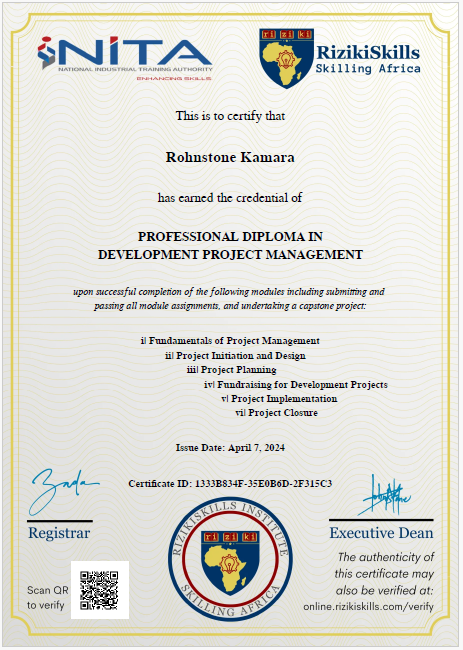Designing, Implementing & Strengthening M&E Systems Course
Sessions & Fees
In-Person – $930 | KSh120000
Live Online – $650 | KSh80000
| 26 – 30 August 2024 | In-Person | Mombasa |
| 2 – 6 Dec 2024 | In-Person | Nairobi |
| 11 – 15 Nov 2024 | In-Person | Mombasa |
| 14 – 18 Oct 2024 | Live Online | Zoom |
| 30 Sep – 4 Oct 2024 | Live Online | Zoom |
| 16 – 20 Sep 2024 | In-Person | Nairobi |
Register for this Course:
Register for In-Person Training
Register for Online Training
Register for In-House/Group Training



Make informed decisions, optimize project performance, and demonstrate impact with robust Monitoring & Evaluation (M&E) Systems! This course equips you with the essential skills to design, implement, and strengthen M&E systems for any project or program. Master key M&E concepts, frameworks, and best practices to ensure your projects are on track to achieve their goals and deliver lasting value.
Become an M&E Expert: Gain comprehensive knowledge of Monitoring & Evaluation principles and methodologies.
Design Effective M&E Systems: Learn to tailor M&E systems to different project types and objectives.
Track Progress & Measure Impact: Develop robust data collection and analysis strategies to measure project performance and impact effectively.
Data-Driven Decision-Making: Leverage data insights to optimize project implementation, resource allocation, and overall effectiveness.
Enhanced Stakeholder Communication: Effectively communicate project progress, impact, and lessons learned to stakeholders.
Module 1: Monitoring & Evaluation Fundamentals
- Demystifying M&E: Core concepts, purposes, and benefits of Monitoring & Evaluation in project management.
- Understanding the M&E Lifecycle: Planning, implementation, analysis, reporting, and utilization of M&E data.
- Introduction to key M&E frameworks (e.g., Results Based Management, Logical Framework) to guide project design and evaluation.
Module 2: Components of a M&E System
- Understanding the 12 components of a M&E system
- Types and scales of M&E systems
Module 3: Designing M&E Systems for Project Success
- Developing a clear Monitoring & Evaluation Plan aligned with project objectives.
- Defining key performance indicators (KPIs) to track progress towards desired outcomes.
- Selecting appropriate data collection methods (surveys, interviews, focus groups, etc.)
- Establishing data collection tools and data management strategies.
Module 4: Implementing and Monitoring Projects
- Putting your M&E plan into action: data collection, monitoring procedures, and quality assurance.
- Utilizing data visualization tools to effectively present monitoring data.
- Identifying and addressing challenges in data collection and analysis.
Module 5: Evaluating Project Impact & Making Data-Driven Decisions
- Evaluating project effectiveness and measuring impact using appropriate methodologies.
- Analyzing data to identify areas for improvement and optimize project performance.
- Leveraging M&E data for informed decision-making throughout the project lifecycle.
Module 6: Strengthening M&E Systems & Reporting Results
- Strategies for continuous improvement and ongoing M&E system maintenance.
- Developing clear and concise reports to communicate project progress, impact, and lessons learned to stakeholders.
- Effective communication strategies to engage stakeholders and ensure M&E findings are utilized.
This course is designed for professionals involved in project management, monitoring & evaluation, and program implementation, including:
- Project Managers
- Monitoring & Evaluation Specialists
- Program Managers
- Researchers
- Data Analysts
- Policy Analysts
- NGO and Development Professionals
To register for your desired training course, simply click on the registration buttons located on the course page or at the footer (for in-person, live online or in-house/group trainings) and provide the requested information.
The fees covers tuition, case materials and booklets, certificate, letter of invitation (where needed), training venue, and AM/PM tea, and snacks and lunch. The fees does NOT include accommodation.
We offer the following convenient payment options:
- Cash
- Mobile Money (M-Pesa)
- Bank Transfer
- Payment Link – a secure payment link that you can use to complete your payment after your registration has been confirmed.
Our training course sessions are scheduled and posted on our website for your convenience. However, If you have a preferred venue and specific training dates in mind, please feel free to propose them when registering.
Our standard course duration for both in-person/classroom and live online programs is 6 hours per day (3 sessions per day).
We have multiple international training venues across Africa (Accra, Lagos, Juba, Addis Ababa, Hargeisa, Kampala, Naivasha, Nairobi, Mombasa, Dar es Salaam, Kigali, Lilongwe, Lusaka, Gaborone, Windhoek, Capet Town).
Our training courses are held at our partnered hotels within the city included within our training.
Our trainings are delivered by qualified instructors with at least a Masters degree and relevant working/industry experience.
If you would like to learn more about the course instructor’s’ qualifications, expertise, and experiences, please email us at training@rizikiskills.com
Yes, we provide assistance by issuing a Letter of Invitation stating that you are confirmed to attend our training.
Yes, here are the following options we can offer to assist you:
- Corporate Discount – We can extend our corporate discount to participants staying at the same hotel, if we have any. Please enquire about the availability of this discount when you register for the training course.
- Nearby Hotel Suggestions – If you prefer other accommodations, we can provide a list of nearby hotels to suit your needs and budget.
Feel free to go through hotel booking platforms on the internet to find the most cost-effective for you.
Yes, RizikiSkills is accredited to offer trainings by the National Industrial Training Authority.
Certification
Earn a credible credential shareable on LinkedIn and e-verifiable from anywhere, anytime. Our courses and programs are accredited by the National Industrial Training Authority (NITA).
